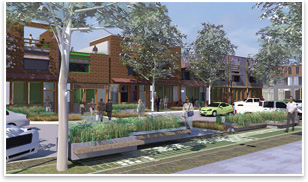
|
Putting the “Green” in Greensburg, Kans.
Tornado-struck city votes to require LEED Platinum certification for new buildings
The USGBC reports that Greensburg’s rebuilding effort has support from Kansas Governor Kathleen Sebelius and the U.S. Department of Agriculture. The U.S. Department of Energy's National Renewable Energy Laboratory and its subcontractors are providing technical assistance on all aspects of energy use and building design in Greensburg. "The city of Greensburg has taken the extraordinary step of committing to rebuild their community to a new vision, not settling for simply recreating what had gone before," said Rick Fedrizzi, president, CEO, & founding chair, U.S. Green Building Council, in a press release issued by the USGBC. "By committing to a recovery plan based on green building, the community's leadership has set a path that will result in a healthier, more livable city for its citizens, turning a crisis into an opportunity that is an example for us all." At rebuilding’s first blush, the city and local AIA members began planning a sustainable effort. Early on, the Kansas Design Team and Disaster Assessment Program began shaping plans for a green rebuilding, and BNIM Architects, Kansas City, Mo., long known for its work in sustainability, helped draft the city’s resolution and educate the community on the benefits of LEED Platinum certification. The firm is also developing a comprehensive master plan to “rebuild Greensburg based on the principles of economic, social, and environmental sustainability.” While other municipalities, such as Washington, D.C.; Scottsdale, Ariz.; San Jose, Calif.; and Asheville, N.C., have passed resolutions requiring LEED certification for city-owned projects, no others to date require anything as stringent as Platinum-level certification. On the state level, Florida alone, as of last July, requires all state-owned buildings to be LEED-certified and all new state buildings to strive for LEED Platinum certification.
|
||
Copyright 2008 The American Institute of Architects. All rights reserved. Home Page |
||
news headlines
practice
business
design
Recent related
› New AIA Research Report Shows Communities Are Going Green
Rendering of proposed downtown Greensburg by BNIM Architects.
For more information on Greensburg’s sustainable rebuilding initiative: www.bnim.com/greensburg
Visit the AIA Committee on the Environment online.

